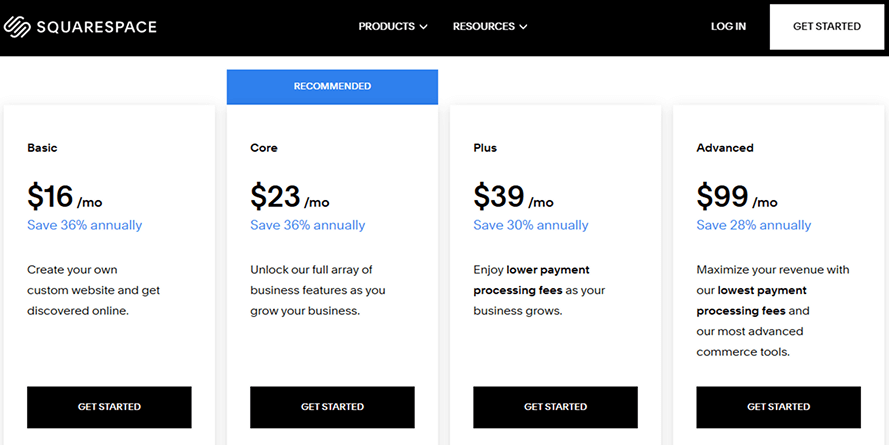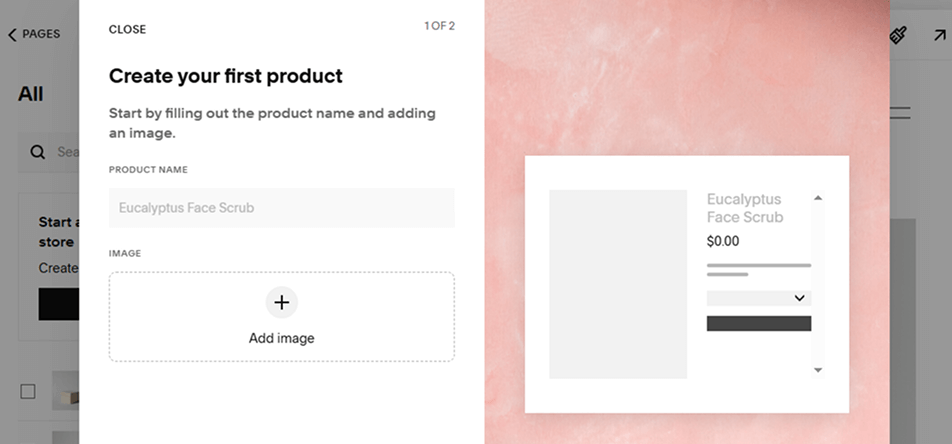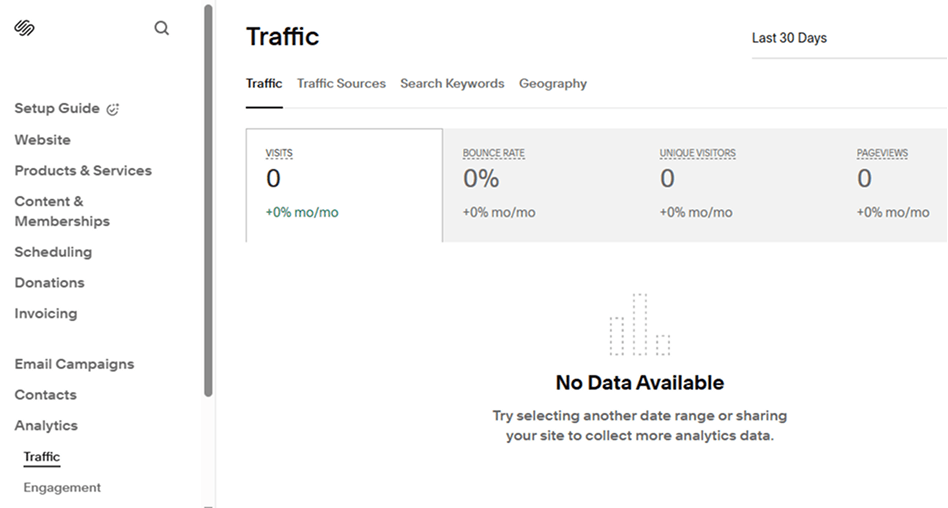Squarespace for Small Business: Complete Guide to Features, Pros & Cons
Whether you’re running a retail store, offering services, or selling handmade products, a well-designed website helps build credibility, attract customers, and grow your revenue. For many business owners and merchants, Squarespace for small business has become the go-to solution.
If you’re a small business owner evaluating your options, this article will help you understand why Squarespace might be the perfect platform for launching or upgrading your website in 2025.
For small business owners who want to make the most of Squarespace’s capabilities—without the learning curve—working with a development partner can accelerate results. Contact us to get your free consultation and discover how we make Squarespace work harder for you.
Quick Post Navigation:
How Squarespace Meets Small Business Needs
Squarespace is an all-in-one website builder designed to help anyone—regardless of technical skill—create a polished, fully functional website. It includes everything from customizable templates and web hosting to ecommerce features, marketing tools, and SEO capabilities.
Unlike traditional websites that require separate hosting, design, and development, Squarespace brings it all together in one place, making it ideal for time-strapped entrepreneurs.
Choosing the right website platform can be overwhelming, especially for small business owners juggling multiple responsibilities. Squarespace stands out by offering a well-balanced solution that combines ease of use, visual polish, and powerful features tailored for business needs. Here’s a deeper look at what makes Squarespace a top choice for entrepreneurs and merchants:
| Feature | Squarespace Offering |
|---|---|
| Cost Efficiency | Four scalable plans (from $16 to $99/month); tailored to different growth stages. |
| Ease of Use | Intuitive drag-and-drop editor; no coding needed; fast setup with visual editing. |
| Templates | 180+ high-quality, responsive, minimalist designs; customizable to fit any brand or industry. |
| Ecommerce | Built-in tools for physical/digital sales, subscriptions, inventory, shipping, POS, and third-party extensions. |
| Marketing & SEO | Includes email campaigns, social media integration, pop-ups, metadata control, SEO tools, Google integration. |
Cost Efficiency
When it comes to affordability and value, Squarespace for small business offers competitive pricing across four premium plans — each catering to different needs and growth stages. Here’s the current breakdown (billed annually):

- Basic – $16/month: Ideal for simple sites or personal portfolios, it includes beautiful templates, a free custom domain, Squarespace AI, and supports up to two contributors. Transaction fees are higher, with credit card processing and online store fees.
- Core – $23/month: A great entry point for growing businesses. It adds unlimited contributors, advanced analytics, CSS/JavaScript customization, and Google Workspace email. It removes online store transaction fees and lowers content/membership transaction fees.
- Plus – $39/month: This tier offers further savings on payment processing, a 1% content/membership fee, and unlocks features like professional shipping tools, sales funnel analytics, and API integrations — excellent for businesses scaling up.
- Advanced – $99/month: Best for high-volume stores, with the lowest payment fees, plus full access to all ecommerce and analytics tools.
Ease of Use
Squarespace is built for users who may not have any background in web design or coding. Its intuitive, drag-and-drop interface allows you to edit pages visually—what you see is what you get. You can:
- Rearrange content blocks by dragging them
- Instantly preview changes before publishing
- Use pre-built sections to quickly add contact forms, testimonials, or call-to-action buttons
This user-friendly approach saves valuable time, letting business owners focus on running their operations rather than figuring out technical issues.

Templates
Squarespace is renowned for its industry-leading templates, offering a curated selection of over 180 designs that prioritize quality and aesthetic appeal. While competitors may offer more quantity, Squarespace focuses on a high-quality, professional finish, with each template built on UI/UX best practices and ensuring full responsiveness across all devices. This means your site will look great and function flawlessly on desktops, tablets, and smartphones, often boasting excellent mobile page load speeds.
The design philosophy typically favors a thoughtful, minimalist aesthetic that effectively showcases content. Concerned about looking “Squarespace-y”? Don’t be. These templates are highly flexible and serve as a sophisticated jumping-off point. Especially with version 7.1, all templates share the same core functionality, allowing for deep customization of colors, fonts, and layouts to uniquely reflect your brand.
Whether you need a portfolio, an online store, or a site for your service business, you can filter the library to find squarespace templates suited to your industry. Squarespace empowers users to create visually stunning, professional websites that capture their brand’s essence, without needing design expertise.
Ecommerce Features
Squarespace positions its e-commerce capabilities with the ambitious tagline, “everything to sell anything,” and for many small to medium-sized businesses, it largely delivers a comprehensive and integrated suite of tools. Whether you’re offering physical goods, digital downloads, services, or even subscriptions (on higher-tier plans), Squarespace Commerce provides a robust framework to manage your online sales.
Setting up an online store is designed to be straightforward. You can easily add a dedicated store page, upload products with detailed descriptions and images, and connect to popular payment processors like Stripe and PayPal. Crucially, essential merchandising tools are built right in. This includes inventory management to track stock levels, varied product display options, features for suggesting related products, and the ability to create limited availability labels to drive urgency. You can also build out a comprehensive product catalog.
The platform guides you through configuring shipping options (including real-time carrier rates on some plans) and setting up tax rules. For businesses with a physical presence, Squarespace offers a valuable integration with Square for in-person point-of-sale (POS) transactions, syncing online and offline sales through the Squarespace iOS app.

For specialized needs beyond the core offering, Squarespace supports a growing list of helpful third-party extensions. This allows you to extend the platform’s power without managing all complexities yourself.
Marketing and SEO Tools
Effective marketing and strong SEO are vital for any business looking to grow online — and Squarespace for small business delivers a well-rounded suite of tools to support both.
Marketing Tools
In terms of marketing, Squarespace for small business doesn’t just stop at SEO — it also empowers you to actively engage and retain your audience. Built-in marketing tools include:
- Promotional pop-ups and announcement bars for timely messages and calls to action.
- Seamless social media integrations to amplify your brand presence.
- A powerful Email Campaigns platform for direct marketing.

The Email Campaigns tool lets you build branded emails, automate workflows (such as welcome sequences), and track performance metrics like open and click rates. This is especially beneficial for small businesses aiming to nurture relationships and convert visitors into customers.
You can choose from various pre-designed email types like “Welcome Emails” or seasonal promotions. While creating draft campaigns is free, sending emails requires a subscription, with plans starting at $7/month (billed annually).
SEO Features
When it comes to SEO, Squarespace small business users have access to a robust set of built-in features that are essential for ranking well on search engines like Google and Bing. These include:
- Customizable page titles, meta descriptions, and URL slugs
- Automatic sitemap generation for easier indexing
- Mobile optimization, which is crucial for SEO performance
- Image alt text settings to improve accessibility and search visibility
You can manage these SEO tools directly from the SEO Panel under your account settings. From this centralized dashboard, you can view metadata, access an SEO checklist, preview search snippets, and even hire an SEO expert if needed. For individual page-level SEO settings, simply click the gear icon in the “Pages” panel to edit metadata on a per-page basis.
Squarespace also supports Google Search Console integration, allowing you to monitor how your site performs in search results. Additionally, you can use Google Analytics or built-in analytics to track visitor behavior and optimize content accordingly.

One potential downside is that Squarespace can occasionally underperform in terms of site speed, which may affect search rankings and user experience. While its design-focused architecture contributes to beautiful layouts, it’s worth optimizing images and limiting third-party scripts to maintain fast load times.
Together, these SEO and marketing tools position Squarespace as a strong solution for small businesses.
For small business owners who want to make the most of Squarespace’s capabilities—without the learning curve—working with a development partner can accelerate results. Contact us to get your free consultation and discover how we make Squarespace work harder for you.
Pros and Cons of Using Squarespace for Small Businesses
Like any website builder, Squarespace comes with strengths and trade-offs. To help you decide if it’s the right fit for your brand, here’s a detailed look at the pros and cons of Squarespace for small business owners:
| Pros | Cons |
|---|---|
| ✅ All-in-One Platform | ❌ Limited Flexibility for Customization |
| ✅ Mobile-Responsive Templates | ❌ Slower Site Speed Performance |
| ✅ SEO and Marketing Tools | ❌ No Free Plan |
| ✅ Ecommerce-Ready at Every Level | ❌ Limited Multi-Language Support |
| ✅ 24/7 Support and Help Resources | |
| ✅ Strong Value for Money |
✅ Advantages
1. All-in-One Platform
Squarespace offers a complete ecosystem — hosting, domains, ecommerce, SEO, and marketing tools — under one roof. This simplicity reduces the need for third-party services, making it ideal for entrepreneurs who want a hassle-free setup.
2. Beautiful, Mobile-Responsive Templates
Design is a standout strength. Squarespace provides professionally designed templates that are visually appealing and optimized for mobile devices. This ensures a polished and consistent look across all screens — which is essential for customer trust and engagement. Choosing the best Squarespace template for small business can instantly elevate your brand.
3. Built-in SEO and Marketing Tools
As covered earlier, Squarespace includes key SEO features like custom metadata, alt text, and automatic sitemaps. Its integrated email marketing and promotional tools help you drive traffic and retain customers without needing extra plugins.
4. Ecommerce-Ready at Every Level
Even the basic plans allow you to sell products, send invoices, and manage digital content or memberships. As your needs grow, you can upgrade to advanced plans for features like sales funnel analytics, shipping integrations, and lower transaction fees — offering a seamless path from startup to scale.
5. Great Support and Help Resources
Squarespace offers 24/7 customer support via live chat and email, along with an extensive knowledge base. This is valuable for business owners without technical teams.
6. Value for Money
Compared to other platforms like Shopify and Wix, Squarespace remains more affordable at equivalent feature levels. This makes it a cost-efficient option when evaluating the best website Squarespace solutions.
❌ Disadvantages
1. Limited Flexibility for Advanced Customization
While you can use custom CSS and JavaScript on Core plans and above, Squarespace doesn’t allow full access to backend code. For businesses needing highly customized or complex functionality, this could be a limiting factor.
2. Slower Site Speed Performance
Some users report that Squarespace sites load slower compared to competitors. While visually rich templates are attractive, they can contribute to longer load times — which may affect user experience and SEO rankings.
3. No Free Plan
There’s no forever-free plan (only a 14-day trial), and while the $16/month Basic plan is competitive, the $99/month Advanced plan might be costly for very small businesses unless they’re generating significant sales volume.
4. Limited Multi-Language Support
Squarespace doesn’t natively support multi-language websites, which can be a drawback for small businesses targeting international audiences.
Squarespace vs. Other Website Builders for Small Business
Choosing the right platform can be overwhelming with so many options available. Here’s how Squarespace stacks up against major competitors like Wix, Shopify, and WordPress — each with its own strengths and limitations.
Squarespace vs. Wix
Wix is one of the most flexible website builders, offering a highly customizable drag-and-drop interface and a larger app marketplace than Squarespace. However, this flexibility often comes at the cost of design consistency — many Wix sites look cluttered if not carefully managed.
- Design: Squarespace wins with cleaner, professionally curated templates — ideal if visual branding is key.
- Ease of Use: Wix is more beginner-friendly in terms of drag-and-drop freedom, while Squarespace offers a structured editor that helps maintain cohesive layouts.
- Ecommerce: Both offer ecommerce, but Squarespace’s pricing is more transparent and its commerce features are well integrated from the start.
Best for: Wix is better if you need maximum flexibility; Squarespace users benefit more from a guided design and seamless experience.
Read more: Full Wix Ecommerce Review
Squarespace vs. Shopify
Shopify is built specifically for ecommerce, and it’s hard to beat when managing large inventories or complex product catalogs. However, its starting price is higher, and many features require additional apps and monthly fees.
- Ecommerce: Shopify leads for serious ecommerce operations, but Squarespace offers plenty for smaller stores — including digital product sales, memberships, and lower-cost plans.
- Ease of Use: Squarespace is easier for beginners, while Shopify may require more setup time and third-party tools.
- Design: Squarespace offers more attractive built-in templates, especially for service-based businesses and creatives.
Best for: Shopify is ideal if ecommerce is your core business. Squarespace works best when ecommerce is just one part of your digital strategy—such as combining a storefront with content, services, or branding.
Read more: 30 Best Shopify Apps That Increase Sales
Thinking of Shopify instead? If your business is more ecommerce-driven and Shopify feels like a better fit, that’s perfectly okay—platform choice should align with your goals. We can support your transition with expert Shopify services, including store setup, custom development, and platform migration to ensure your online business runs smoothly and scales effectively.
Squarespace vs. WordPress
WordPress is the most flexible and scalable platform — but it’s not a traditional website builder. It requires more technical know-how, hosting management, and ongoing maintenance. You can build anything with it, but at the cost of time and complexity.
- Ease of Use: Squarespace wins by far. WordPress is a developer-friendly platform, not ideal for non-tech-savvy users.
- Cost: WordPress can be cheaper initially, but expenses for hosting, themes, plugins, and maintenance can add up.
- SEO and Content: WordPress is powerful for blogging and content-heavy sites; however, Squarespace’s built-in SEO tools are sufficient for most small businesses.
Best for: WordPress is better for businesses needing highly custom solutions; Squarespace is better for fast, elegant websites with built-in tools.
While other platforms may outshine it in niche use cases (like massive online stores or developer-driven sites), Squarespace hits a sweet spot for simplicity, performance, and professional polish.
Is Squarespace Good for Small Businesses? Final Verdict
In today’s competitive landscape, small business owners need more than just a website—they need a complete online presence that’s easy to manage, visually professional, and equipped to grow alongside their business. Squarespace for small business delivers on all fronts, offering a polished, all-in-one platform that simplifies everything from design and ecommerce to SEO and marketing.
Whether you’re selling handmade goods, running a service-based business, or launching a brand for the first time, Squarespace gives you the tools to get online quickly and confidently—without needing a team of developers or designers.
Squarespace is ideal for entrepreneurs who want elegant design, user-friendly tools, and a strong foundation to build their digital brand. And if your business grows beyond what it can offer, you’ll have already established a strong online identity to carry forward.
Building a standout Squarespace site—solo or with a partner—is crucial for your brand. Don’t hesitate to reach out! We’re here to help you craft a site that truly brings your vision to life.




